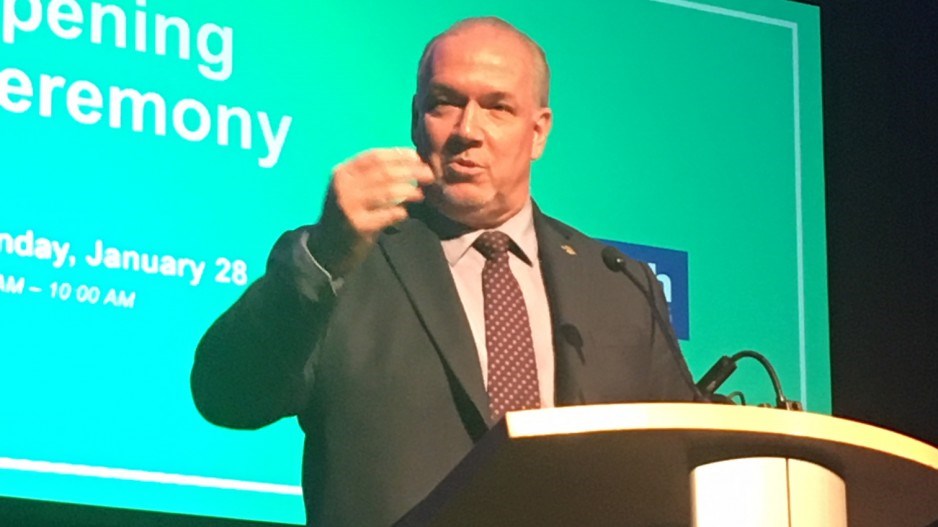British Columbians living in Vancouver may not think of mining and mineral exploration as something that impacts them, but Vancouver is a global mine hub, with 1,200 mining and exploration companies headquartered here.
Copper and metallurgical coal exports have, at times, rivaled lumber as B.C.’s largest export commodities.
So whether Vancouverites realize it or not, mining is an important part of Vancouver’s economy, Premier John Horgan said at the opening of the Association of Mineral Exploration (AME) Roundup conference Monday January 28.
“People often think of mining – certainly in my community on the Island – they think of mining as a rural undertaking,” Horgan said. “Mining is as important to urban British Columbia as it is to rural British Columbia.”
But B.C.’s exploration sector has struggled in recent years to attract the investment needed to makes the discoveries that can lead to new mines being built.
As part of the NDP government’s efforts to support exploration efforts, Horgan announced Monday that two tax credits that have in the past been renewed on an annual basis will now become permanent.
Both the mining flow-through share and the B.C. mining exploration tax credits are intended to provide investors with incentives to invest in exploration and mining. But the industry could never count on those incentives, because they have, for years, been renewed on an annual basis.
The B.C. government is now making them permanent, and the federal government has also announced that federal mining and exploration tax credits will also be extended for five years.
Making the tax credits permanent was one of the recommendations of the NDP government’s Mining Jobs Task Force. Horgan said his government will also hire more staff for the mines ministry to help speed up permitting.
“We’re going to dedicate new resources so we can make our processes faster and more efficient,” Horgan said.
The government will also earmark $1 million for the Regional Mining Alliance, which promotes mining and indigenous partnerships, especially in the Gold Triangle in northwest B.C.
Horgan said $330 million was invested in exploration in B.C. in 2018, which is up from the $250 million spent in 2017. That is still low compared to what was being spent on mineral exploration in B.C. prior to a commodity price crash that started around 2011.
While B.C. is blessed with an abundance of minerals, it is also seen as a problematic jurisdiction to do business in, in part due to unsettled land claims and lengthy and costly environmental review processes.
Horgan also acknowledged the perception that left-leaning governments are hostile to resource development. But he pointed to the $40 billion LNG Canada project as evidence that his government supports resource development.
"It's the largest private sector investment in Canadian history, and I'm a social democrat, and I apparently wasn't able to do any of that, according to my enemies, Horgan said." I wasn't able to balance budgets. I wasn't able to come and talk to industry about anything."
But even that project – which secured benefits agreements with every First Nation along a natural gas pipeline corridor – has run into problems with First Nations.
The New Year began with images of the RCMP enforcing an injunction and arresting some members of the Wet’suwet’en First Nation that had been blocking a road near Houston, B.C. and preventing Coastal GasLink pipeline workers from accessing the area.
The elected members of the Wet’suwet’en support the LNG Canada project and associated pipeline, as do a number of hereditary chiefs. But some hereditary chiefs oppose the project.
“Those were images that are not good for British Columbia, not good for investment, certainly not good for the Wet’suwet’en, but images that we will have to work hard to erase from the public mind,” Horgan said. “And that does not just happen with the waving of a wand – it happens with hard work."
Horgan’s government has made reconciliation with First Nations within all of its ministries. Horgan pointed to First Nations like the Tahltan, which has been a strong supporter of mining in its territory, as evidence that some First Nations welcome resource development, because it provides their people with jobs and other community benefits.
"Every indigenous community that you work in wants to see benefits for their community," Horgan said.
“Certainty on the land base is absolutely critical for investment. Social justice and economic justice is absolutely critical for indigenous communities. Those two things are not separate – they are the same.”




